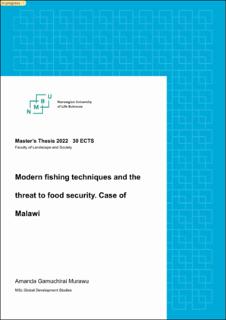| dc.contributor.advisor | Bishal, Sitaula | |
| dc.contributor.advisor | Limuwa, Moses | |
| dc.contributor.author | Murawu, Amanda Gamuchirai | |
| dc.coverage.spatial | Malawi, Mangochi | en_US |
| dc.date.accessioned | 2022-11-02T11:05:46Z | |
| dc.date.available | 2022-11-02T11:05:46Z | |
| dc.date.issued | 2022 | |
| dc.identifier.uri | https://hdl.handle.net/11250/3029562 | |
| dc.description.abstract | The trajectory of this study was to assess the use of modern fishing techniques and their relation to food security in a given context of Malawi. The study was conducted by the qualitative research approach to assess modern fishing methods used by fishers in Mangochi, Malawi. An interpretivist philosophy informed the gathering of qualitative data for this study in which data were gathered in given ground reality. The case study design was employed to gather data that answered the research questions about the effectiveness of modern fishing techniques used in Malawi. Twelve local fishers from the Mangochi district of the Southern Region of Malawi consisted of the study sample interviewed to gather data. The researcher used the snowballing technique to recruit those fishers who participated in the study. Interviews were conducted with the fishers while reports and other relevant documents were reviewed to answer the primary research questions of the study. Qualitative data analysis was adopted to analyze the data gathered using interviews and document reviews. Malawi's modern fishing technique fishers include nets (Gillnets, Seine nets, Trammel nets, and drift nets), hooks, line fishing trawls, and traps (pots and baskets). These modern fishing methods promote overfishing to the extent that fish stocks sometimes dwindle to the detriment of the fishers. As a result, fishers' livelihoods are not stable, resulting in hunger. Hunger is prevalent among fishers in Malawi in the Mangochi district. The study indicates that local media can primarily promote awareness of food security. Local media coverage allows people to understand the importance of the fishing industry in terms of its contribution to people's lives in terms of nutritional value and providing income to the fishers. The interventions suggested by the respondents to improve modern fishing techniques used by fishers included; support by stakeholders; attaining sustainability in the management of fisheries; training of fisheries in sustainable fishing techniques; use of modern technologies such as GPS in tracking and monitoring fishing activities; and mobilization of funds to promote fishing activities in Malawi. There is a need for the fishers in Mangochi to be sensitized by the fisheries department and other stakeholders such as FAO on sustainable modern fishing methods that promote food security and ensure their livelihoods. | en_US |
| dc.language.iso | eng | en_US |
| dc.publisher | Norwegian University of Life Sciences, Ås | en_US |
| dc.rights | Attribution-NonCommercial-NoDerivatives 4.0 Internasjonal | * |
| dc.rights.uri | http://creativecommons.org/licenses/by-nc-nd/4.0/deed.no | * |
| dc.subject | Lake Malawi | en_US |
| dc.subject | Sustainability | en_US |
| dc.title | Modern fishing techniques and the threat to food security : case of Malawi | en_US |
| dc.type | Master thesis | en_US |
| dc.description.version | submittedVersion | en_US |
| dc.description.localcode | M-DS | en_US |

